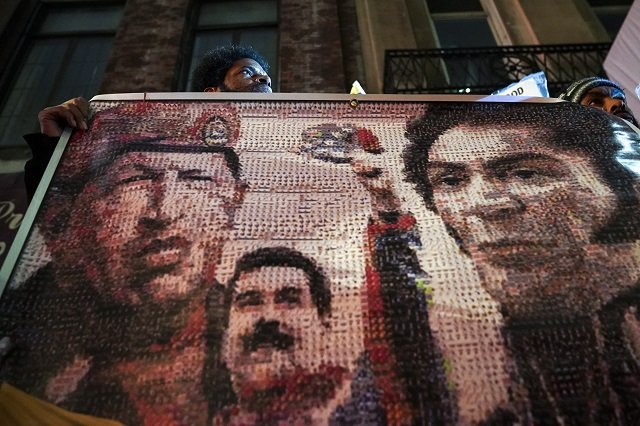
The US intervention was only challenged by Hugo Chavez in the 1990s when he united several South American states in an effort to oust US interests from the continent. Since then the US is constantly striving to remove socialist governments that sprang to power after the Pink Tide, reviving the spirit of freedom in the continent. And right after Chavez’s death the US has increased its efforts manifold to undo the Pink Tide from the continent.
So, when US-backed Juan Guaido declared he was the acting president of Venezuela in Jan 2019, that was like completing the circle around Maduro and it seemed like Maduro, who had half the charms that Chavez had and was neck-deep in the country’s economic crisis, has thin chances of survival against this blatant intervention of the US and its European allies on the democratic setup of Venezuela.
But Maduro has survived, rather given quite the fightback. So much so that Pinera put the blame of the protests in Chile on Maduro’s regime, saying, “We are at war with a powerful enemy that respects nothing.” Earlier, Pinera has been a staunch critique of Maduro and has, in concert with the US, given full support to Guaido. In February, Pinera joined Guaido in the Colombian side of the Venezuela-Colombo border bridge to witness a ‘controversial’ delivery of humanitarian aid to Venezuelans — a move many back in Chile disapproved.
Later, on several occasions, Pinera has raised his voice against Maduro. In September he bluntly said, “Maduro is part of the problem and will never be part of the solution. We need to end this regime... the final conclusion must be that we have to do everything possible to ensure that this regime does not continue”.
In October, the Chilean foreign minister said that Chile would “work with allies to cut off Venezuela’s communications, shut down its air space and implement a naval blockade if Nicolás Maduro refuses to hold free elections”.
“Working with allies” is a clear indication that most right-wing regimes in South America stand with the US in not only opposing but in taking all practical measures to oust leftist regimes in the continent. And these practical measures need not be legal or in accordance with international norms, but can be anything from military intervention against a democratically elected system, to economic blockade, or even trying to control public opinion by the adverse use of social tools.
Yet, the amazing thing that has happened is that though Maduro has been able to survive all economic lows, the coalition of several powerful states of the world, attempted coups, and the threat of military intervention from the US; the strong rightist government of Chile seems to be the one in trouble now.
In April, Chileans came out in 33 cities across the country, to protest against “policies that affect living conditions such as increases in basic services costs, low and unjust salaries, privatised pension system, discrimination of women and minorities, tax injustice, precarious working conditions”. The protests that were triggered by Pinera’s raising the Metro de Santiago subway’s fare are actually a revolt against the stark inequality in the Chilean society and the people’s inability of coping with rising prices — issues synonymous with those that started protests against Maduro in 2014, like shortages in supplies and the decreasing living standard of the people.
The question is: Were Maduro’s socialist policies, which failed when suddenly oil prices dropped in the world market, the real unforgivable sin of an authority against its people? Or, are Pinera’s neoliberal capitalist policies, which ease accumulation of wealth and are raising inequalities around the world, to be blamed as the real sin against the people? This is an age-long debate that does not end owing to the fact that both these systems have loopholes; and unless governments have the will and power to moderate both, the capitalist or the socialist ideals for the welfare and steady progress of their people both systems will fail their people somewhere down the line. What we need to fight for should not be our theoretical ideals but the eventual welfare of our people.
But sadly, it seems that the US is going to stand by its theoretical ideal, exactly for the reason that it does not want the welfare of South America, but wants to be its imperial master that is able to use its riches for its own high-end living. Perhaps this is the reason why South America is becoming a chessboard of the contending right and left.
In Bolivia, when the leftist Evo Morales faced violent protests and allegations of fraud after his re-election, Maduro described these protests as “a destabilisation campaign” and “an attempted coup d’etat from external forces that try to deny Bolivian voters, the Bolivian people their democratic rights”. To the surprise of many, on November 12, Morales was forced to resign and flee to Mexico. Morales said he was forced to leave as a bounty of $50,000 had been put on his head and his people were being “harassed, persecuted and threatened”, and that this was clearly a coup.
As this rift between South American nations widens, it has become a chessboard for international players, from the EU to Russia and China. And with Russia’s experience of intervening in Trump’s elections and being part of so many conflicts around the world, it would only be thinkable that it may be lending its expertise to Venezuela in making things difficult for its opponents.
So, are Pinera’s apprehensions about Maduro true? Does Venezuela have a hand in Chile’s protests? This could be just as true as the possibility of Chile and Colombia partaking in the Bolivian protests.
Published in The Express Tribune, February 7th, 2020.
Like Opinion & Editorial on Facebook, follow @ETOpEd on Twitter to receive all updates on all our daily pieces.
1731570357-0/elon-musk-(1)1731570357-0-405x300.webp)
-(1)1717678110-0/Kendrick-(1)-(1)1717678110-0-165x106.webp)










COMMENTS
Comments are moderated and generally will be posted if they are on-topic and not abusive.
For more information, please see our Comments FAQ